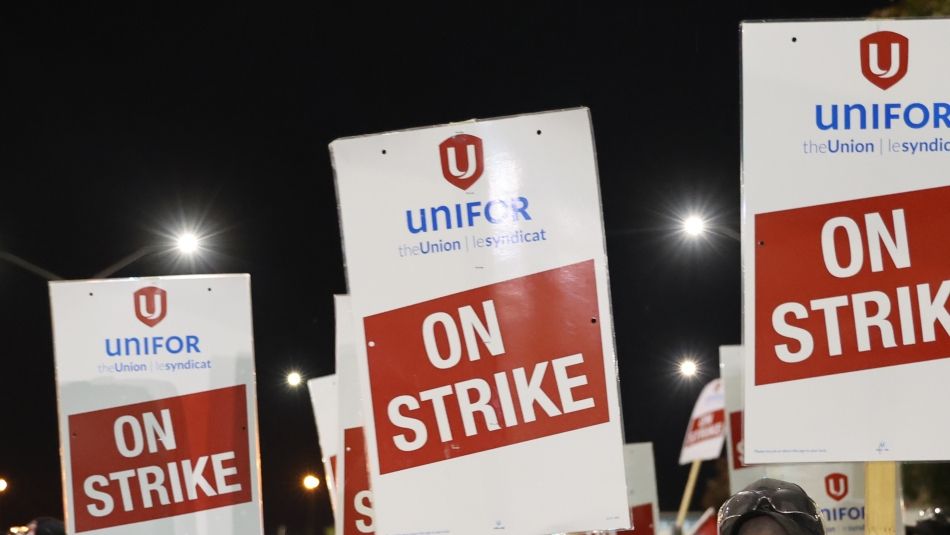
Share
By: Lana Payne
Labour disputes are complicated affairs.
I should know.
This past year, Unifor members have faced more strikes and lockouts than at any time in the union’s 10-year history.
Making the decision to go on strike is a difficult one for workers. It takes an emotional and financial toll on individuals and families. It’s a measure of last resort, and for good reason. That’s why strikes occur in less than two percent of union contract negotiations.
This month, the federal government, with crucial backing from the NDP, tabled Bill C-58.
It’s a piece of new legislation to protect workers during a labour dispute. The bill expressly prohibits employers in the federal sector from using replacement workers to do the jobs of those who are on picket lines. C-58 closes a mammoth loophole that’s existed in our labour laws for decades. A loophole that’s significantly benefitted employers, and that no prior government has had the guts to tackle.
Enabled by these backward laws, employers can – and do – employ replacement workers, or “scabs”, to keep their businesses running regardless of a strike or lockout. Corporate bosses can hire scabs at a whim, without reprisal.
Federal Labour Program figures reportedly show that among all labour disputes that took place between 2011 and 2022, employers hired scabs 40 percent of the time.
That’s an embarrassing figure, especially in a country like Canada that claims high workplace standards and respect for fundamental rights and freedoms.
What’s most astonishing is that figure undershoots the extent of the problem. For instance, it doesn’t count the number of times employers used the threat of scabs to gain a bargaining advantage over workers. This long-standing tactic has led workers to abandon strike plans, and settle deals, even before a dispute arises. Unifor members at Bell Canada witnessed this first-hand in 2022.
It doesn’t take a labour expert to understand the twisted logic of these inherently one-sided labour laws.
They are designed to reduce worker power and distort the collective bargaining process in favour of corporations. If employers can carry on business-as-usual, regardless of a strike, what good is this for workers? Unifor members working in essential services like health care, who are denied the right to strike, feel this pressure everyday.
It is well documented that scabs contribute to toxic work environments and incidents of violence on picket lines. Unifor and its predecessor unions have experienced this directly, including during a 2002 labour dispute at Navistar International’s truck plant in Chatham, Ontario, where the use of scabs was a flashpoint for conflict. In that highly publicized incident, a security guard working for a third-party firm hired by the company drove a van through a group of strikers and their supporters on the picket line, injuring three, one of them critically.
In their opposition to Bill C-58, employer groups are cherry-picking all sorts of counter-intuitive research, suggesting that employing scabs is good for the economy.
What I know is the three longest Unifor labour disputes between 2013 and 2020 all involved the use of scabs. In fact, all Unifor disputes involving scabs lasted six times longer on average than those without scabs. Put simply, scabs hurt workers and the economy.
Bill C-58 doesn’t fix all the fundamental flaws in Canada’s labour system. The bill also has its flaws, including an unnecessarily long 18-month implementation period. The bill doesn’t even apply to provincially regulated industries where most Canadians work.
Nevertheless, it provides a major course correction on workers’ rights in Canada and it has strong public support.
Anti-scab laws have historically been favoured by nearly all federal political parties, including the Liberals, NDP, Greens and Bloc Quebecois. Of course, the notable exception is the Conservatives, who have consistently voted against workers on this issue. Under Pierre Poilievre’s Conservative Party leadership, it doesn’t appear that this position will change.
We all know that the right to collective bargaining including the right strike is a fundamental part of Canada’s democracy.
It is a right that far too many workers around the world are denied.
It is the single, greatest power that workers have to win fair wages, strong benefits, and higher work standards.
When those higher standards are won in union workplaces, they tend to spill over into other workplaces, benefitting everyone.
Labour disputes are complicated affairs. I know this. But there is nothing complicated about the value of unions.


